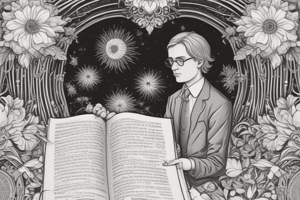Podcast
Questions and Answers
What is the name of the lab mouse in the story Flowers for Algernon?
What is the name of the lab mouse in the story Flowers for Algernon?
- Charlie
- Dr. Strauss
- Algernon (correct)
- Professor Nemur
What is the significance of Algernon's character in the story?
What is the significance of Algernon's character in the story?
- He is a minor character who only appears in the beginning of the story.
- He is a symbol of Charlie's own destiny and serves as a reflection of his future. (correct)
- He is the main character of the story and undergoes the surgery before Charlie.
- He is a rival of Charlie and tries to sabotage his progress.
What is the final request of Charlie in the story?
What is the final request of Charlie in the story?
- To be cured of his newfound intelligence.
- To tell his story to the world.
- To continue the research and help others.
- To put flowers on Algernon's grave. (correct)
What is the title of the story inspired by?
What is the title of the story inspired by?
What is the theme of the story that has been explored in other works of science fiction?
What is the theme of the story that has been explored in other works of science fiction?
Why has the novel been challenged and banned on several occasions?
Why has the novel been challenged and banned on several occasions?
What is the name of the episode of It's Always Sunny in Philadelphia that satirizes the plot of Flowers for Algernon?
What is the name of the episode of It's Always Sunny in Philadelphia that satirizes the plot of Flowers for Algernon?
How many direct film and television adaptations of Flowers for Algernon have been made?
How many direct film and television adaptations of Flowers for Algernon have been made?
What is the significance of Flowers for Algernon in the science fiction genre?
What is the significance of Flowers for Algernon in the science fiction genre?
What is the relationship between Charlie and Algernon?
What is the relationship between Charlie and Algernon?
What was Algernon's role in the study?
What was Algernon's role in the study?
What does Charlie see Algernon as?
What does Charlie see Algernon as?
Why does Charlie insist on putting flowers on Algernon's grave?
Why does Charlie insist on putting flowers on Algernon's grave?
What is the final line of the short story?
What is the final line of the short story?
How many stage and radio adaptations of Flowers for Algernon have been made?
How many stage and radio adaptations of Flowers for Algernon have been made?
What is the theme of the story that has been explored in other works of science fiction?
What is the theme of the story that has been explored in other works of science fiction?
What is the significance of the title of the story?
What is the significance of the title of the story?
Why was Algernon's character important in the story?
Why was Algernon's character important in the story?
What is the tone of the episode of It's Always Sunny in Philadelphia that satirizes the plot of Flowers for Algernon?
What is the tone of the episode of It's Always Sunny in Philadelphia that satirizes the plot of Flowers for Algernon?
What is the significance of the novel's ban and challenge?
What is the significance of the novel's ban and challenge?
Flashcards are hidden until you start studying
Study Notes
Overview of Flowers for Algernon
- "Flowers for Algernon" is a science fiction short story and novel by Daniel Keyes, first published in 1959.
- The story explores the idea that "ignorance is bliss" and questions whether it is better to be aware of the world's unhappiness or to be ignorant of it.
Author and Context
- Daniel Keyes was an American writer, born in 1927 and died in 2014.
- "Flowers for Algernon" is his most famous work, and he also published several other novels, including "The Fifth Sally" and "The Asylum Prophecies".
- Keyes worked as an English teacher and a creative writing professor, and was notable for his work in the science fiction genre.
Awards and Adaptations
- "Flowers for Algernon" won a Hugo Award in 1960 and a Nebula Award in 1967.
- The novel has been adapted multiple times, including at least six direct film and television adaptations, more than ten stage and radio adaptations, and even parodies.
Plot Summary
- The story follows Charlie Gordon, a 32- or 37-year-old man who experiences a brief period of greatly increased intelligence.
- Charlie's intelligence increases rapidly, but he soon realizes that there is a flaw in the procedure that will cause him to regress back to his initial state.
- He experiences the rapid loss of his newfound intelligence and decides to leave his life, his destination uncertain.
Themes
- The cycle of life: the story echoes the life cycle of all humans, from a childlike state of ignorance to gaining knowledge and eventually losing faculties.
- The danger of knowledge: intelligence can hurt as much as it can help, as Charlie's experiences enrich his life but also harm his relationships and sense of self.
- Fate: Charlie's fate is set from the beginning of the story, and he is unable to change his path.
Characters
- Charlie Gordon: the protagonist, a sweet man who sees those around him as kind, but is initially unaware of people laughing at him due to his intellectual disability.
- Miss Alice Kinnian: Charlie's writing teacher, who recommends him for the experiment and becomes his romantic interest.
- Algernon: a lab mouse that is also taking part in the study, and forms a close bond with Charlie.
Significance
- "Flowers for Algernon" is significant in the science fiction genre, and has inspired other works, including adaptations and parodies.
- The novel has been challenged and even banned for its sexual content on several occasions.
Overview of Flowers for Algernon
- "Flowers for Algernon" is a science fiction short story and novel by Daniel Keyes, first published in 1959.
- The story explores the idea that "ignorance is bliss" and questions whether it is better to be aware of the world's unhappiness or to be ignorant of it.
Author and Context
- Daniel Keyes was an American writer, born in 1927 and died in 2014.
- "Flowers for Algernon" is his most famous work, and he also published several other novels, including "The Fifth Sally" and "The Asylum Prophecies".
- Keyes worked as an English teacher and a creative writing professor, and was notable for his work in the science fiction genre.
Awards and Adaptations
- "Flowers for Algernon" won a Hugo Award in 1960 and a Nebula Award in 1967.
- The novel has been adapted multiple times, including at least six direct film and television adaptations, more than ten stage and radio adaptations, and even parodies.
Plot Summary
- The story follows Charlie Gordon, a 32- or 37-year-old man who experiences a brief period of greatly increased intelligence.
- Charlie's intelligence increases rapidly, but he soon realizes that there is a flaw in the procedure that will cause him to regress back to his initial state.
- He experiences the rapid loss of his newfound intelligence and decides to leave his life, his destination uncertain.
Themes
- The cycle of life: the story echoes the life cycle of all humans, from a childlike state of ignorance to gaining knowledge and eventually losing faculties.
- The danger of knowledge: intelligence can hurt as much as it can help, as Charlie's experiences enrich his life but also harm his relationships and sense of self.
- Fate: Charlie's fate is set from the beginning of the story, and he is unable to change his path.
Characters
- Charlie Gordon: the protagonist, a sweet man who sees those around him as kind, but is initially unaware of people laughing at him due to his intellectual disability.
- Miss Alice Kinnian: Charlie's writing teacher, who recommends him for the experiment and becomes his romantic interest.
- Algernon: a lab mouse that is also taking part in the study, and forms a close bond with Charlie.
Significance
- "Flowers for Algernon" is significant in the science fiction genre, and has inspired other works, including adaptations and parodies.
- The novel has been challenged and even banned for its sexual content on several occasions.
Studying That Suits You
Use AI to generate personalized quizzes and flashcards to suit your learning preferences.



